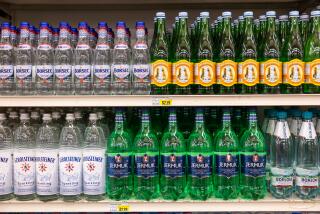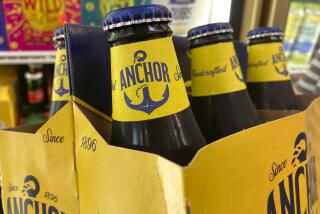TIDES OF TASTE : Mexican Beer, New York Fizz Give Distributor Unexpected Lift
- Share via
Although Corona beer and New York Seltzer are two of the hottest products in the local beverage market, Charles F. Beach didn’t think much of them at first. He figured that Mexican beer was faddish and that seltzer was too old-fashioned.
But Beach, president of the firm most commonly known as Best-Way Distributing Co., the largest independent beer distributor in the San Fernando Valley, got talked into selling them anyway. He added the brands to a product line that has been dominated by Miller beer for 26 years.
He hasn’t regretted it. This year, the Sylmar-based company expects sales to jump 20% from last year, when it had revenue of $35 million, and Beach attributes the gain mostly to Corona and New York Seltzer.
Beach, 60, knows all too well about changing business fortunes and fickle consumer tastes: Goebel beer and Oh-So-Grape, the two big products that in the 1940s supported Best-Way’s predecessor company, are ancient history.
But Beach says Best-Way is prospering these days. He walks proudly past Best-Way’s fleet of 51 trucks and through the 106,000-square-foot warehouse, filled with cases stacked up to 20 high.
The company, which does business as Best-Way but whose official name is Allied Beverages, is one of the 10 largest beer distributors in the state. In Los Angeles County, it is one of six regional distributors for Miller, the nation’s No. 2 brewer after Anheuser-Busch.
Beach says tastes in beverages reflect social trends. “Corona’s a young person’s beer,” he said. “It’s a way for them to say they’re different from the old man.”
But, when Beach originally was won over to the idea of selling Corona, he consented only because he figured it would appeal to the Valley’s Latino population, not a broad age group.
A simple hunch prompted Beach to sell New York Seltzer as well.
It “just looked different,” he said.
In any case, Beach says, he bears only a modest risk in picking up a new product line. The worst thing that ever happens is “getting stuck with too much inventory and wasting your sales staff’s time,” he said.
The company was founded 32 years ago by Ralph D. Williams, now 62, who still serves as chairman while delegating the responsibility for daily operations to Beach. Williams is the company’s sole owner.
Williams and Beach met in the 1940s at what was then Sunset Beverages, a Burbank bottler and distributor owned by Williams’ father-in-law, Otis Reilly. By 1954, the company had moved, changed its name and spun off a unit headed by Williams that became Best-Way. The new company began to distribute Hamm’s beer in the Valley, as it still does.
“In the beginning, Ralph and I used to drive the trucks, load them and unload them,” Beach said, grinning.
Now, Beach says, they’re counting profits. Best-Way charges an average of $9.40 for a case of beer, reflecting an average 22.5% markup over the price the brewer charges. Retailers such as supermarkets and liquor stores then add an average markup of 25% before selling to consumers.
But wholesaling beer isn’t just a matter of pocketing the difference between what the supermarkets and tavern owners pay and what the brewers charge.
There are high fixed costs in operating a fleet--trucks can cost $50,000 each--and in maintaining refrigerated warehouse space. Bars, industry experts say, frequently make for bad debtors. And distributorships are labor-intensive; Best-Way employs 160.
Wholesalers also can’t afford to hold on to their inventory very long. Beers are stamped with expiration dates, usually 120 days after packaging. Distributors that order too much have to pour the surplus down the drain.
Industry Consolidating
The industry has been consolidating as many distributors are pushed out of business. The number of wholesalers nationwide has dropped 25% over the last five years, to about 4,200. In California, according to the Sacramento-based California Beer and Wine Wholesalers Assn., there are 190 wholesalers, down 14% over the same period.
“People tell me they’re going to become beer distributors and I ask them why,” said Jerry Steinman, publisher of Beer Marketer’s Insights in West Nyack, N.Y. “Even a strong brand in one part of the country can get eaten alive somewhere else.”
Nevertheless, through franchise deals, wholesalers gain the exclusive right to distribute their brands within defined territories. The state Department of Alcoholic Beverage Control, under its regulatory authority, permits the agreements, protecting them from antitrust challenges.
For any supermarket between Glendale and the Ventura County line that wants to sell brands such as Miller, Corona, Hamm’s, Olympia, Lowenbrau and Labatt’s, the only legal supplier is Best-Way.
Wholesaler Picked First
The same is true for restaurant and tavern managers, but they can afford to be pickier about what brands they carry. A bar might sell Miller, but not Anheuser-Busch’s Budweiser, or vice versa. Many bar managers say they first pick which wholesaler they want to deal with and then decide on their brands.
“Service and dependability is all that matters,” said Hendrik Mowilos, general manager of the Sagebrush Cantina in Calabasas, which sells eight brands of beer. “I can call Best-Way any time of day and have a delivery within an hour and a half.”
Mowilos concedes that customers can have strong brand loyalties, though. For example, he says, eight out of nine beers the restaurant sells are Coronas.
Best-Way’s biggest competitor is Anheuser-Busch’s distributor in Sylmar, which is one of only 11 distributors in the nation owned by the brewer. Anheuser-Busch’s other 170 distributors are independent businesses, as is Best-Way.
Distributors’ prices in California and many other states aren’t negotiable. The Alcoholic Beverage Control Department requires a wholesaler to charge all its customers the same price, with no volume discounts, to protect mom-and-pop stores that couldn’t otherwise compete.
Giveaways Banned
Wholesalers, unlike beer makers, also are banned from giving away promotional gifts such as clocks, mugs, T-shirts and hats.
“We’re not allowed to offer inducements. I can only give things with pure promotional value, like neon signs,” said Beach, speaking in an office filled with Miller memorabilia. “Clocks tell time, so they have value. I have to sell them.”
Beach also has to sell consumers and retailers on the merits of his brands. Best-Way contributes about $200,000 a year to promotional campaigns.
But for now, Beach says, Corona is practically selling itself. He says he is moving 80,000 cases a month of the beer, up from 500 a month three years ago when he reluctantly began selling the brand. It accounts for 16% of the company’s sales.
New York Seltzer, which now accounts for 5% of Best-Way’s business, has enabled the firm to pick up customers that don’t have liquor licenses. The company had never sold soft drinks other than bottled water until it began carrying New York Seltzer in January.
More to Read
Inside the business of entertainment
The Wide Shot brings you news, analysis and insights on everything from streaming wars to production — and what it all means for the future.
You may occasionally receive promotional content from the Los Angeles Times.










